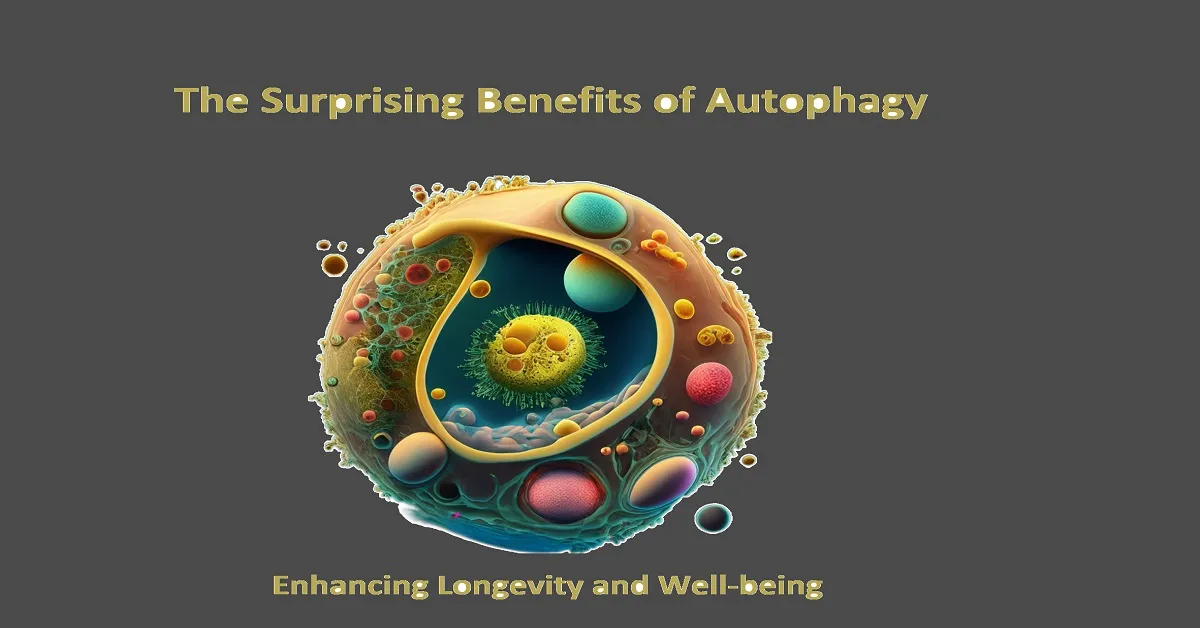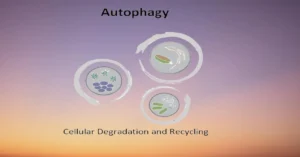Introduction
Autophagy is a natural cellular process that plays a crucial role in maintaining overall health and well-being. It is a Greek word that means “self-eating,” which accurately describes the mechanism involved. During autophagy, cells break down and recycle their own components, including damaged proteins and organelles. This process helps to remove toxins, prevent the accumulation of harmful substances, and promote cellular rejuvenation. In our previous article about Autophagy, we delved into the concept of autophagy; however, In this post, we will explore the 20 incredible benefits of autophagy and how it can optimize cellular health and enhance longevity and well-being.
1. Benefits of Autophagy in Cellular Health
1.1. Removal of Damaged Proteins and Organelles
Autophagy plays a crucial role in eliminating damaged proteins and organelles. By selectively targeting these components for degradation, autophagy prevents the accumulation of toxic substances within the cells, maintaining their optimal function.
1.2. Cellular Cleansing and Detoxification
Through autophagy, cells undergo a thorough cleansing process, removing harmful substances and toxins. This detoxification enhances cellular health and improves the overall well-being of our body.
1.3. Improved Energy Efficiency
Autophagy allows cells to recycle unnecessary or surplus components, providing them with a constant supply of energy sources during times of nutrient scarcity. This energy efficiency promotes cellular survival and function.
2. Autophagy and Longevity
Research suggests that autophagy plays a significant role in promoting longevity. By removing damaged components and maintaining cellular health, autophagy helps delay the aging process, contributing to a longer and healthier lifespan.
3. Autophagy and Disease Prevention
3.1. Cancer
Autophagy acts as a double-edged sword in cancer. While it can prevent tumor initiation by removing damaged cells, it can also promote cancer cell survival in established tumors. Nonetheless, modulating autophagy holds promise as a therapeutic strategy in cancer treatment.
3.2. Neurodegenerative Diseases
Autophagy dysfunction has been implicated in neurodegenerative diseases such as Alzheimer’s and Parkinson’s. Enhancing autophagy may help remove toxic protein aggregates, potentially slowing down or preventing the progression of these diseases.
3.3. Cardiovascular Health
Autophagy plays a crucial role in maintaining cardiovascular health. It helps remove damaged lipids and proteins in blood vessels, preventing the formation of plaques and reducing the risk of cardiovascular diseases.
4. Autophagy and Weight Management
Autophagy can aid in weight management by promoting the breakdown of stored fats and the elimination of excess cellular components. By enhancing autophagy, individuals may experience improved metabolic function and better weight control.
5. Autophagy and Enhanced Cognitive Function
Autophagy is closely linked to cognitive function. By clearing out damaged proteins and improving cellular health in the brain, autophagy can enhance memory, learning, and overall cognitive performance.
6. Autophagy and Muscle Development
Autophagy is essential for muscle development and maintenance. By selectively eliminating damaged muscle fibers, autophagy paves the way for the generation of new, healthier muscle tissue, contributing to improved strength and physical performance.
7. Autophagy and Improved Immune Function
Autophagy plays a vital role in immune cell function. It helps eliminate intracellular pathogens and damaged immune components, enhancing the overall effectiveness of the immune response and promoting better immune function.
8. Autophagy and Anti-Aging Benefits
As we age, autophagy tends to decline, leading to the accumulation of damaged cellular components. By enhancing autophagy through lifestyle interventions or targeted therapies, we can potentially slow down the aging process and enjoy anti-aging benefits.
9. Autophagy and Skin Health
Autophagy promotes skin health by eliminating damaged proteins and organelles in skin cells. This process helps rejuvenate the skin, reducing the appearance of aging signs and contributing to a youthful and radiant complexion.
10. Autophagy and Increased Cellular Regeneration
Autophagy promotes cellular regeneration by clearing out old and damaged components, making way for the generation of new and healthier cells. This cellular rejuvenation contributes to overall tissue repair and regeneration.
11. Autophagy and Stress Resistance
Autophagy helps cells adapt and survive in stressful conditions, such as nutrient deprivation, oxidative stress, or infection. By enhancing cellular resilience, autophagy enables cells to better withstand adverse conditions and maintain optimal function.
12. Autophagy and Improved Metabolic Health
Autophagy plays a crucial role in maintaining metabolic health. By eliminating damaged components and promoting cellular energy efficiency, autophagy contributes to improved metabolic function and helps regulate glucose and lipid metabolism, contributing to overall metabolic health. Dysregulation of autophagy has been associated with metabolic disorders such as obesity and type 2 diabetes. By enhancing autophagy, we can optimize metabolic function and promote a healthy weight.
13. Autophagy and Improved Exercise Performance
Autophagy is closely linked to exercise adaptation and performance. It helps remove damaged proteins and organelles accumulated during physical activity, facilitating muscle recovery and adaptation, leading to improved exercise performance.
14. Autophagy and Gut Health
Autophagy plays a vital role in maintaining gut health. It helps eliminate damaged cells and promotes the renewal of the intestinal lining, contributing to improved gut barrier function and overall digestive health.
15. Autophagy and Hormonal Balance
Autophagy is involved in maintaining hormonal balance within the body. By removing damaged cellular components, autophagy ensures proper hormone production and signaling, promoting optimal hormonal balance.
16. Autophagy and Improved Sleep Quality
Autophagy has been linked to improved sleep quality. By facilitating the elimination of cellular waste and promoting cellular rejuvenation, autophagy may contribute to better sleep patterns and overall sleep health.
17. Preservation of Mitochondrial Health
Mitochondria are the powerhouses of our cells, responsible for energy production. However, dysfunctional mitochondria can generate harmful reactive oxygen species (ROS) and compromise cellular health. Autophagy helps maintain mitochondrial health by selectively removing damaged mitochondria through a process called mitophagy. By preserving the quality of mitochondria, autophagy supports cellular energy production and overall well-being.
18. Reduction of Inflammation
Chronic inflammation is a common underlying factor in many diseases, including cardiovascular disease, neurodegenerative disorders, and cancer. Autophagy can help reduce inflammation by removing damaged cellular components that can trigger an immune response. Additionally, autophagy plays a role in regulating the production of pro-inflammatory cytokines, further contributing to the anti-inflammatory effects. By reducing inflammation, autophagy promotes overall health and well-being
19. Promotion of DNA Repair
DNA damage is a common occurrence due to various factors, including exposure to environmental toxins and natural metabolic processes. Autophagy plays a role in repairing damaged DNA by removing and recycling DNA fragments and damaged proteins. This process helps maintain genomic integrity and reduces the risk of mutations that can lead to cancer and other diseases.
20. Protection Against Liver Diseases
The liver is responsible for detoxification, metabolism, and the production of important proteins. Autophagy is crucial for maintaining liver health and preventing liver diseases. It helps remove damaged organelles, protein aggregates, and lipids that can accumulate in the liver and impair its function. By promoting liver health, autophagy contributes to overall well-being and longevity.
Conclusion
Autophagy, the self-eating process within our cells, offers an array of incredible benefits for optimizing cellular health and enhancing longevity and well-being. From improved cellular function and disease prevention to enhanced cognitive function and anti-aging benefits, autophagy is a key player in maintaining our overall health and vitality. By understanding and harnessing the power of autophagy through lifestyle interventions, we can unlock its full potential and experience the transformative effects it brings to our lives.




